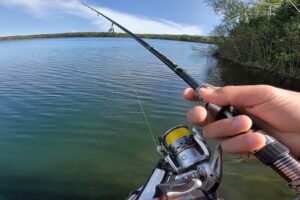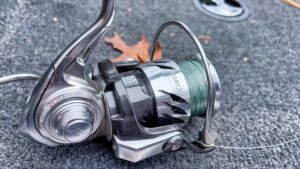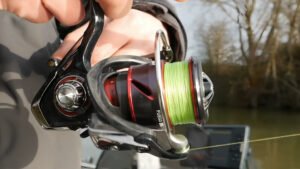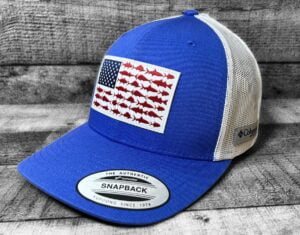Lures
7 Best Fall Bass Lures To Use In The Autumn Season
When fall arrives, it’s a great time to be a bass angler out on the water. Many people have left the water behind and with the crowds gone, it can be one of the best times to be throwing your line for some bass.
Home » The Best Bass Lures » 7 Best Fall Bass Lures
Find The Top Fall Bass Fishing Lure For This Autumn
In early fall, bass will still be in the deeper waters, but as the water temperatures begin to drop, the bass will begin to migrate to shallower water to hunt for food.
Fall is when shad and other bait fish begin their fall migration looking for plankton to feed on. For connected bodies of water this migration will typically lead the shad upstream into back creeks and coves. For closed off lakes, the shad will migrate through the lake typically staying in shallower water.
During this time of the year shad generally group together in schools of fish and form an almost sphere shape suspended close to the surface.
When the shad are held up together like this they become easy prey for bass. Bass will follow beneath the group of shad and will periodically feed on them when they are tightly grouped together.
The key to catching bass in the fall is to find the areas where these schools of shad are hanging out and fish around them. If the shad are there, you can be pretty confident the bass are close by.
Top 7 Fall Lures For Bass Fishing
Use the following lures in autumn to help maximize your bass catch.
For more lure recommendations, click here to see our article on the best bass lures.
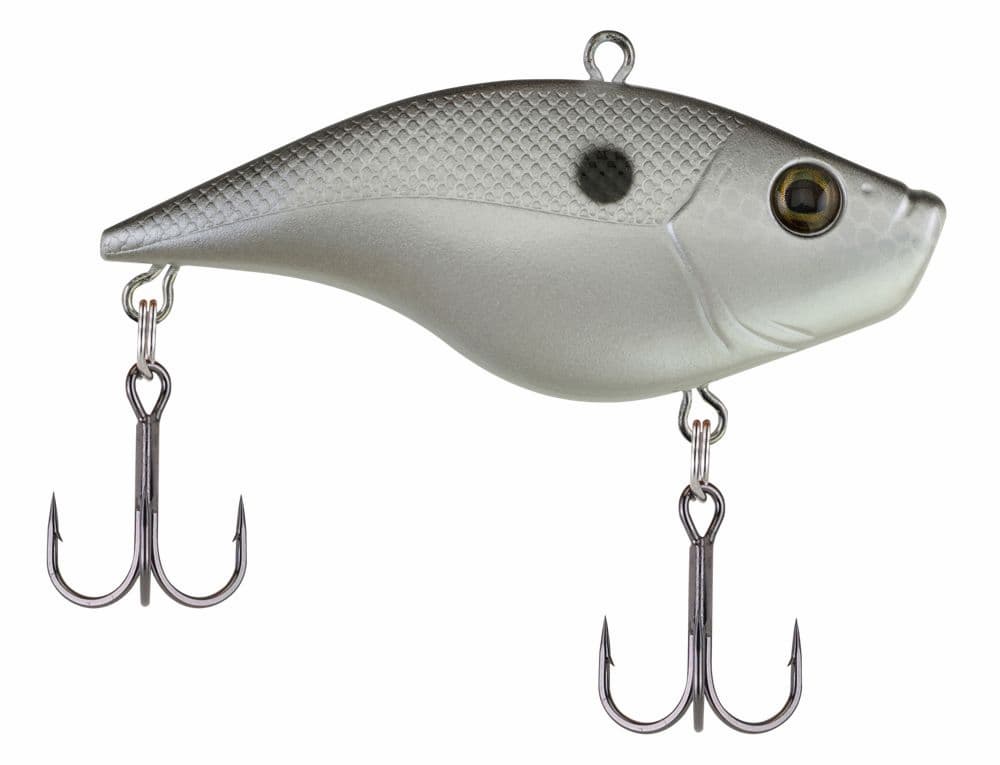
Lipless Crankbaits
The lipless crankbait is a favorite fall bass lure. Not only are lipless crankbaits great at covering large areas of water, but they do a great job at attracting bass from a distance.
Lipless crankbaits have a diving action as they move through the water. Their designed action as well as their rattling vibration does a great job of mimicking a distressed bait fish. Causing this lure to look like an easy target.
They are a weighted lure that will naturally sink to the water’s bottom. They can be fished in clear water or within cover like grass beds. Due to the open treble hooks you should probably avoid using them in very thick weeds or extremely heavy structure as you may get stuck.
There are a number of different ways to fish a lipless crank. The most typical is to just cast out the lure and reel it back in.
A few other great alternatives to try out are:
- Throw a long cast and allow the lure to sink to the bottom before reeling it in. Once retrieving the lure, pause every few rotations and allow the crankbait to pause in the water for a moment before retrieving it again.
- During the retrieve try to make long, slow, sweeping curves to mimic a shad’s movement.
- Utilize a yo-yo or pull & drop style allowing the lure to sink to the bottom before beginning to retrieve. Once it’s hit the bottom, jerk your rod up so that the crankbait shoots up from the floor a few feet and then allow it to sink back down. Continue to repeat this process. This is intended to more directly mimic a wounded baitfish’s erratic swimming pattern.
If you’ve located an active group of bait fish in an area, try throwing a cast directly in front of them or slightly to one side. You can try ripping through the center, but you’ll usually have better success staying along the edges and beneath the group. This sets your lure up as a lone shad that is easier to pick off.
Lipless crankbaits come in a variety of sizes with different coloring options. They also have a wide variety of actions.
One of our favorites for fall fishing is the Berkley Warpig Lipless Crankbait.
The Warpig has a great action and holds up very well.
They come in a good variety of colors and sizes. Which allows you to match the color and size of the baitfish in the area you’ll be fishing in, whether shad, shiners, or bluegill they have a good selection.

Recommended Lipless Crankbait:
Berkley Warpig Lipless Crankbait
With a wide range of colors and sizes the Warpig is one of the best lipless crankbaits on the market. This lure holds up well and does great at attracting bass in the fall.
Recommended Rig Setup:
- Rod: 7‘ Medium-Heavy to Heavy action
- Reel: 6.1:1 gear ratio
- Line: 12-20 lbs fluorocarbon
Alabama Rig

The Alabama rig, or a-rig for short, is an amazing fishing device and works especially well in the fall. While not exactly a lure the Alabama rig is a device that allows you to attach multiple lures, hooks, and baits to a single line.
The Alabama rig is based on the umbrella rig which is typically a more robust device and used for saltwater fishing while trolled behind a boat. The a-rig is a lighter version which allows you to use it with a normal casting or spinning rod and reel.
What makes the Alabama rig work so well in the fall is the ability to replicate a small group of shad or other baitfish that have been separated from the larger group.
Since bass are so keened in on the migrating shad a-rigs can present them with what looks like a group of easy prey.
Alabama rigs come in a variety of different sizes and designs. Most commonly you’ll find them with around 3 or more arms that allow you to place on the same number of baits or lures.
Many designs also incorporate willow blades that add more action and flash when in the water. Depending on the model you choose, with a single line you can replicate a school of 18 bait fish swimming through the water.
Now, the tricky part with a-rigs is that they are not legal in all states. So, before purchasing one make sure you check out your local laws to make sure you can fish with it.
Our favorite is the 6th Sense Fishing Divine Umbrella Rig.
They feature a few different color options and multiple willow blade designs. They are made out of stainless steel and have held up well for us.
Overall, if legal in your state, we definitely recommend using an Alabama rig this fall, we know you won’t be disappointed!

Recommended Alabama Rig
6th Sense Fishing Divine Umbrella Rig
With the 5 arms and multiple spinning willow blades, the 6th Sense Fishing Divine Umbrella Rig does an excellent job of replicating a small school of bait fish in the water. It’s simple to use and after a few practice casts it’s easy to get some great distance on this rig!
Recommended Rig Setup:
- Rod: 7’6″-8′ Medium-Heavy rod
- Reel: 5.4:1 up to 7.1:1 gear ratio (you want enough torque in your rod to handle the potential load of multiple fish.)
- Line: 50-100 lbs braid (make sure your reel is able to hold enough of the line you get)
Spinnerbaits
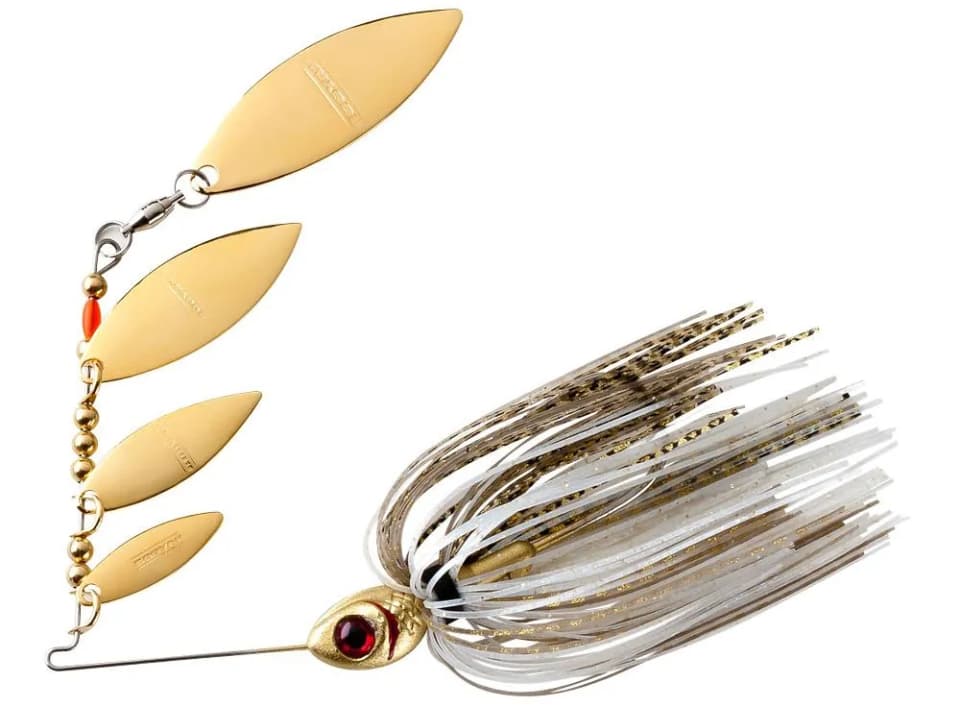
If you’re looking for a more versatile lure that still mimics a small group of bait fish, the spinnerbait is the lure you want to check out.
Utilizing a flashing blade that spins around as the lure moves through the water, spinners are one of the best lures to use when bass are feeding on shad. As the lure travels through the water, the multiple blades look like small minnows.
In the fall, gizzard shad and baitfish are reaching a larger size in their life cycle. Shad will generally reach 3 to 4 inches by October, which allows you to use larger spinnerbaits and still look natural.
There are numerous ways to fish spinnerbaits. One of our favorites is to find a group of shad that are disturbing the waters surface and cast past the target area. Then begin the retrieve and keep the lure just below the surface of the water. You want to reach the top of the surface and create a small wake. Do this for a short distance and then pause your retrieve and allow the spinnerbait to begin to sink down for a few feet and then resume the retrieve.
If you’re not getting a good response to this strategy, or you’re not visually seeing any swarming shad to cast around, then try slow rolling the bottom in deeper water.
It seems like especially in the fall, the really big fish like to hang out toward the bottom and hit up easy prey.
Slow rolling a spinnerbait along the bottom will allow the bass to feel the vibrations and trigger a reaction strike as your lure passes by.
You’ll want to send out a long cast and allow your lure to sink to the bottom and then slowly begin retrieving your line. You want to continue to feel your spinnerbait tapping the bottom. As you come into contact with various structures and cover, pause for a moment and allow the lure to have a momentary rest before returning to your retrieve.
Slow rolling along the bottom like this will make your spinner bait look like an easy meal for a big bass fish that’s too lazy to go chasing their prey all over the lake.
One of our all-time favorite spinnerbaits is the Booyah Super Shad Blade-Bait.
We really like these lures during multiple seasons of the year, but they do work quite well in autumn.
We like the larger size of this spinnerbait with the 4 willow blades. It does a good job mimicking a small group of shad and works well regardless of the technique we use with it.
Overall, the Booyah Super Shad Blade-Bait is a great spinnerbait and worth having in your arsenal.

Recommended Spinnerbait
Booyah Super Shad Blade-Bait
The Booyah Super Shad is one of our all time favorite spinnerbaits. It does an excellent job at attracting bass and it absolutely crushes it in the fall!
Recommended Rig Setup:
- Rod: 6’10”-7′ moderate action
- Reel: 6.4:1 gear ratio
- Line: 15-20 lbs fluorocarbon
Glide Baits

If all you’re wanting to catch are the largest bass in the water, going with a glide bait is a great way to do just that.
Glide baits are a single jointed artificial lure that’s designed to resemble a large bait fish. You’ll typically find glide baits in sizes from 5-10 inches.
The way that glide baits are designed allows them to have a side to side swimming action while moving through the water when being reeled straight in.
A good glide bait does a great job resembling a real fish.
The idea of a lure this large is to intimidate smaller bass and attract giant bass to an easy meal.
Fishing with a glide bait for the first time can be a little disappointing unless you shift your mindset a bit. Glide baits do not generally get as many strikes as most other lures. If you go into fishing a glide bait thinking that you’re going to catch fish every cast, you’re going to be disappointed.
If you use glide baits with the understanding that there are far fewer giant bass in the water than there are average sized ones and that you really only want hookups from the big ones you should be good.
To effectively fish a glide bait, you’ll need to have a good understanding of where the big bass hang out. This can either be gained by experience or a good fish finder.
When you’ve settled on a spot start with a good long cast and allow the glide bait to begin to sink. Glide baits work well in most depths, but during the fall months you’ll find the best zone to be 10 to 16 feet deep.
Begin slowly retrieving the lure once in the target depth. The goal is for your glide bait to look like a slow meandering bait fish. This slow roll will attract nearby bass that will begin lurking behind your glide bait.
During the retrieve try adding in some quick jerks to the side every once in a while. This will look like a quick dart and may trigger a reaction strike from a bass that’s following behind.
Glide baits work best during the day and when the water visibility is pretty good.
Some good places to try fishing glide bats are steep points, bluff banks, along the side of deep grass beds, and near points.
One of the best glide baits we’ve used is the Storm Arashi Glide Bait.
We love the action on the Arashi glide bait. They swim so naturally and have great reaction when you jerk the rod. The come in a variety of different bait fish colors to match the hatch of your body of water.
They have a natural looking decent into the water when sinking, with their head slanted down at an angle, and it’s easy to get the S shaped swimming action from them.
Overall, we’ve been extremely happy with them.
The only downside, is that they’re not cheap. While not as expensive as some glide baits out there, they still cost more than 99% of other lures in our arsenal.
So if you’re looking for a good glide bait at a slightly more economical rate than we suggest checking out TRUSCEND Glide Baits. They come in a pack of 3 for the same price of a single Arashi glide bait. While we’re not as big of a fan of the TRUSCEND glide baits, they do work pretty well and should get the job done nicely for those on a budget.

Recommended Glide Bait
Storm Arashi Glide Bait
The Arashi glide bait does an amazing job replicating a real fish. It has a fluid motion on retrieve, a natural look when sinking, and great reaction to small flicks of the wrist that allow easy 180 degree movements. This is definitely a glide bait worth owning!
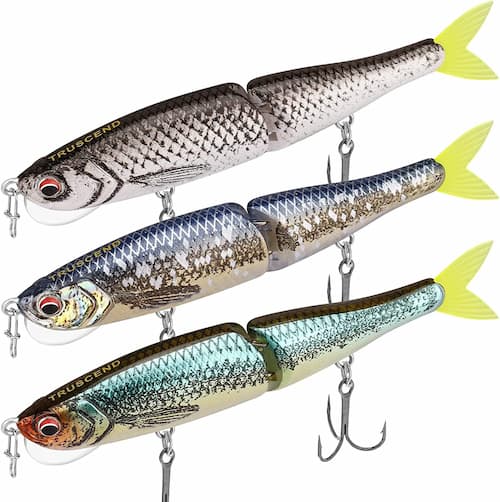
Economically Priced Glide Bait:
TRUSCEND Glide Bait
The TRUSCEND Glide Bait don’t look as natural as the Arashi, but you get 3 for the price of one. So if you’re just getting started with glide baits and looking to test out the strategy first the TRUSCEND should do the job just fine.
Recommended Rig Setup:
- Rod: 7’11”+ heavy action
- Reel: 5.0:1 up to 6.3:1 gear ratio
- Line: 20 lbs fluorocarbon
Topwater Walkers

Topwater walkers are another great option for fall fishing, particularly in earlier fall before the water temperatures start to drop.
Topwater walkers are a type of artificial lure that floats on the surface of the water. They are typically long and slender and made out of plastic or wood. In appearance, they often resemble jerk bait, but are designed to stay on the surface.
They have a built-in ball that rattles inside the walker adding an audible sound to the lure to help attract nearby bass.
Walkers are typically around 3″ to 6″ long and have one or two treble hooks on the underside of them.
There are numerous designs of walkers with some flattening out the lure’s face to create more water disturbance on retrieve, incorporating spinners to make the lure act more erratic, and many other designs.
Walking bait is typically fished using the walk the dog style.
This makes the lure perform a zigzag motion on the water during the retrieve.
To achieve this result, you’re going to cast out your walker. Once landing on the water allow your lure to pause for a moment while you pull in most of your slack, but not all of it.
With your rod tip pointing down toward the water, slightly jerk your rod left or right so that the tip of the rod moves about 6″ in the direction you’re moving.
Take in some of the slack that you created through this motion and now repeat in the opposite direction.
Continuing to repeat this motion while keeping your line slightly slack will produce the desired zigzag effect while slowly bringing the lure back to you.
There are multiple different ways to fish a walker in the fall, but some of our favorites are
- Finding a group of schooling bait fish and casting beyond the group and then walking the dog over or to the side of the group.
- Walk the lure on the edge of a grass bed or lily pads or even through the top of one that is not very thick.
- Fish next to the edge near and around fall downs or tree roots.
- Under docks or other structures offering a place for largemouth bass to hide waiting for an easy meal.
One of our favorite top water walkers for the fall is a shad colored Storm Arashi Top Walker 11 Fishing Lure, however, they’re out of stock at every retailer we’ve checked. So we’ve added our runner up below, the Berkley Choppo.
We’re able to get a great walk the dog action out of the lure and bass seem to eat it up.
If you’re looking for a great topwater bait other than a Spook, you should check out the Arashi Top Walker.

Recommended Topwater Walker:
Berkley Choppo Top Water
Recommended Rig Setup:
- Rod: 6’01”-7’4″ med heavy
Reel: 7.1:1 gear ration
Line: 20-30 lbs braid
Soft Plastic Baits
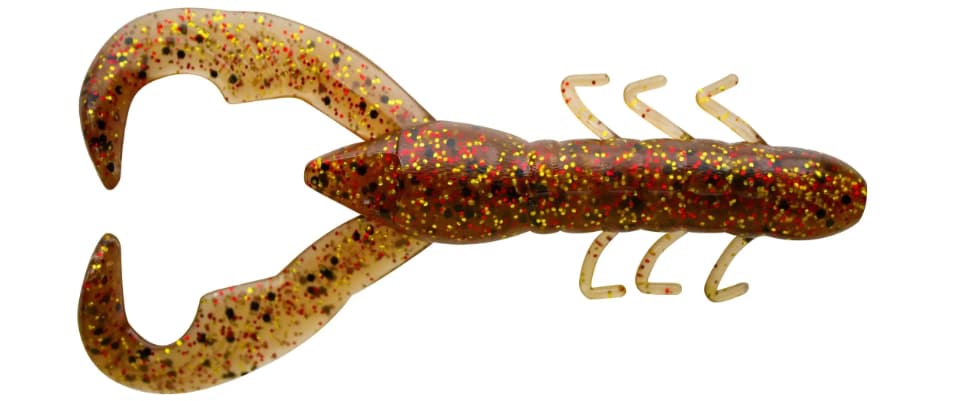
There are thousands of different soft plastic bass baits to choose from, from a finesse worm to a creature bait, and many of them can work great in autumn.
We’ve caught some trophy bass before using plastic worms during this time of the year, but one of our favorite soft plastics to throw in the fall is an artificial crawfish.
Many anglers think that fishing craws is reserved for the spring time only, but that’s not the case. Most species of crawfish mate two times a year. In the spring as well as in the fall.
During the mating seasons, the male crawdads are actively in the water looking for a mate versus burrowed down hiding in the mud.
You’ll typically find crawfish earlier in the autumn season before the water starts to cool. Once the water gets below 50′, the fall mating season will usually come to an end.
The best place to find crawfish during this time of the year is in and around rocky structures. You can look for these formations near the shore or even the bottom of the water. You may need a good sonar fish finder to locate these edifices if they’re very deep.
The key is that when the crawfish are out and about, bass are lurking nearby in order to snatch up a crustacean meal which makes these locations great places to drop a line.
We’re fans of the YUM Chrsitie Craw Soft Plastic. They come in a variety of different colors and are just about the right size.
You’ll have the best success catching large and smallmouth bass in the fall with a plastic crawfish if you match the color of the reel thing in your body of water. You can buy a few different packs of colors to test out which one works the best, but crawfish color can vary and change multiple times throughout the year. So finding a way to catch one to get the exact color will work the best.

Recommended Fall Soft Plastic:
YUM Chrsitie Craw Soft Plastic Bait
Recommended Rig Setup:
- Rod: 7’2″-7’6″ Medium-Heavy to Heavy
- Reel: 7.1:1+ gear ratio
- Line: 17-20 lbs fluorocarbon
Buzzbaits
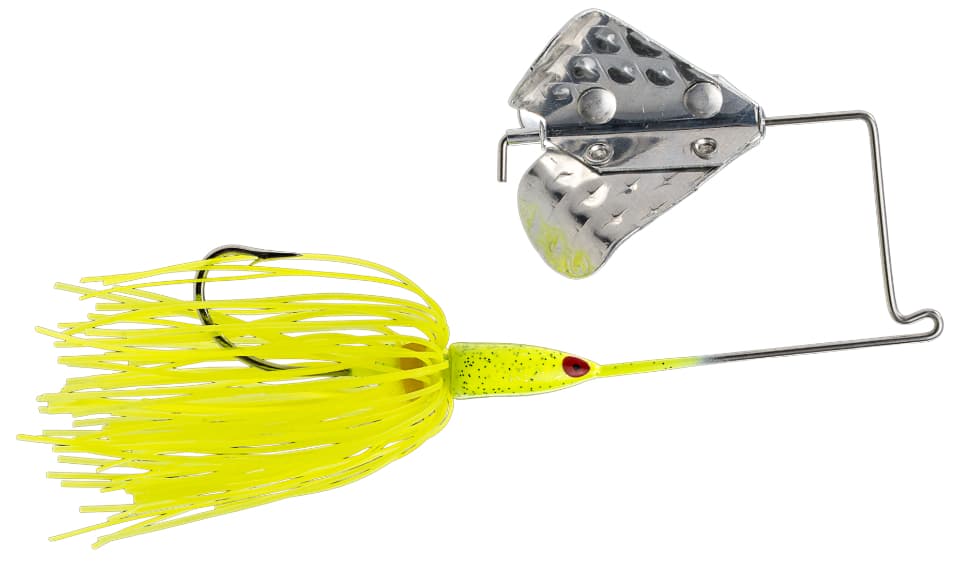
Buzzbaits an unusual topwater lure because they don’t naturally float. Buzzbaits are kept at the surface of the water due to a blade like propeller at the front of the lure that creates lift when being retrieved through the water.
Buzzbaits literally create a buzz as the surface of the water and produce a good amount of bubbles and disturbance at the top of the water to draw bass in.
Buzzbaits are typically a j shaped wire frame with the propeller blade at the top of the J with a swim jig like skirt and hook and the bottom back of the wire.
We really like using Buzzbaits first thing in the morning as well later in the evening.
At nighttime, through the spring and fall seasons, shad begin to move into very shallow water and cover to bunker down for the night. They move up into the tree lines, grassy areas, moss beds, hydrilla, and other vegetation where they can find sufficient protection.
In the morning, they will head back out into deeper water where they’ll begin moving for their migration throughout the day.
It’s during this transition period where we find Buzzbaits work great.
We’ll throw them in and around all the areas where the bait fish have been hiding out through the nighttime hours because there are inevitably bass hanging out for breakfast.
Buzzbaits are a fairly simple lure to fish with.
You can fish Buzzbaits up and around tree lines and in and around grassy areas. Buzzbaits are fairly weedless by design, so they work pretty well ripping through fairly heavy cover.
Depending on the day and mood, we’ll fish them with and without trailers.
In the fall we really like going with lighter colors like white or chartreuse.
Our favorite Buzzbait is the Strike King Tri-Wing King Buzz Bait.
The 3 blade design of the propeller creates a beautiful amount of commotion on the water that just seems to pull the bass into it.
We have great success just using the lure alone, but will occasionally throw on a trailer to see if it helps our odds out.

Recommended Buzzbait:
Strike King Tri-Wing Buzz King Bait
The Tri-Wing Buzz King works wonders. This topwater lure does an astounding job at drawing bass out of cover. It works great with our without a trailer. The triple blade propeller generates the perfect amount of disturbance on the water’s surface catching the eye of any nearby bass. They are available in multiple different color and size options and hold up well to hard hits and being ripped through cover. If you’re looking for a great buzzbait for this years fall fishing, check out the Tri-Wing Buzz King.
Recommended Rig Setup:
- Rod: 7’2″ Med Heavy
- Reel: 7.1:1+
- Line: 40 lbs braid
Fall Bass Fishing Challenges
There are a couple of challenges that anglers have during the fall.
First, it can be difficult to locate groups of shad as they are often moving to different locations of the water throughout the day.
Keep your eyes out for small splashes, disturbances, and flickering on the water surface. This will often be the subtle evidence of a school of shad you need to be watching for.
If you’re fishing from a boat, a sonar fish detector can be a big help during this time.
Because even when you do find a group of shad, they will likely not stay in one place for very long before moving on.
The second challenge you’ll face is that bass are very focused in on the shad during this time of the year. Bass are looking to fatten up before the winter months, and the easy shad meals can be difficult to compete against.
So it’s important to use the right bass lures to maximize your bass catch this autumn.
As an Amazon Associate I earn from qualifying purchases.
Table of Contents
Table of Contents
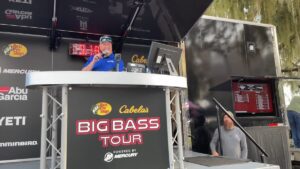
10 Most Popular Bass Fishing Tournaments
Bass fishing is not only an exciting past time, but also a serious sport. With millions of dollars in prize money up for grabs, bass tournaments can get pretty serious. Check out some of the top bass fishing tournaments that happen every year.
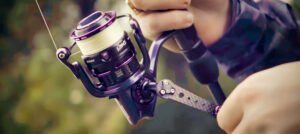
Abu Garcia Revo Ike Spinning Reel Review
Designed by Mike Iaconelli, the Abu Garcia Revo Ike spinning reel is an extraordinary reel that can compete with just about any newly released spinning reel on the market. With features like Rocket Line Management System, Rocket Spool Lip Design, and Carbon Matrix drag system, it’s perfect for bass fishing. Read our full review to see if this spinner is worth its premium price tag.
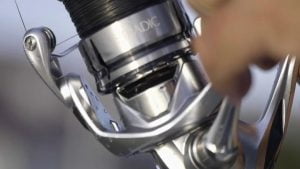
Shimano Stradic FL Review
The Shimano Stradic FL spinning reel is a workhorse that holds up well to abuse and consistently reels in bass for us. The Stradic FL is one of our favorite reels and we think it could be your too. If you’re looking for a new spinning reel, do your self a favor and check the Stradic FL out.

